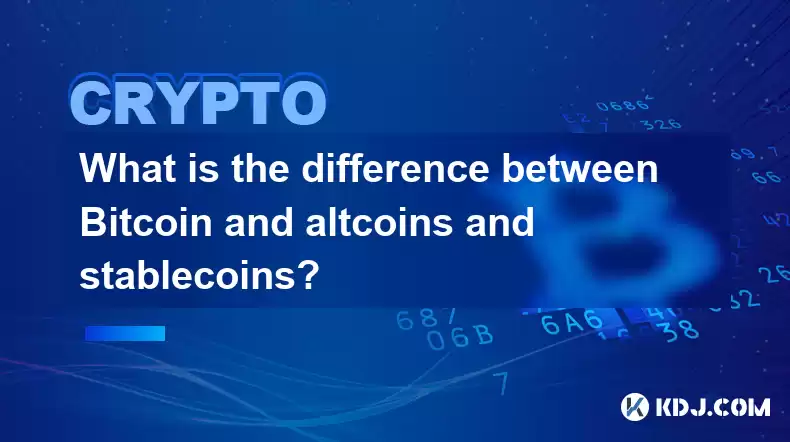-
 Bitcoin
Bitcoin $112400
-1.07% -
 Ethereum
Ethereum $3409
-3.27% -
 XRP
XRP $2.784
-6.60% -
 Tether USDt
Tether USDt $0.9997
-0.03% -
 BNB
BNB $739.3
-2.09% -
 Solana
Solana $158.0
-2.90% -
 USDC
USDC $0.9998
-0.02% -
 TRON
TRON $0.3213
-0.94% -
 Dogecoin
Dogecoin $0.1929
-5.01% -
 Cardano
Cardano $0.6974
-2.82% -
 Hyperliquid
Hyperliquid $36.69
-2.31% -
 Sui
Sui $3.327
-4.80% -
 Stellar
Stellar $0.3672
-5.18% -
 Chainlink
Chainlink $15.65
-3.07% -
 Bitcoin Cash
Bitcoin Cash $525.0
-1.68% -
 Hedera
Hedera $0.2291
-6.00% -
 Avalanche
Avalanche $20.91
-2.96% -
 Ethena USDe
Ethena USDe $1.000
0.00% -
 Toncoin
Toncoin $3.520
-1.12% -
 UNUS SED LEO
UNUS SED LEO $8.968
0.14% -
 Litecoin
Litecoin $105.7
0.26% -
 Shiba Inu
Shiba Inu $0.00001181
-1.79% -
 Polkadot
Polkadot $3.492
-2.08% -
 Uniswap
Uniswap $8.800
-3.10% -
 Dai
Dai $0.9999
-0.01% -
 Monero
Monero $289.9
-3.17% -
 Bitget Token
Bitget Token $4.243
-1.27% -
 Pepe
Pepe $0.00001006
-3.67% -
 Cronos
Cronos $0.1248
-5.68% -
 Aave
Aave $249.7
-2.50%
What is the difference between Bitcoin and altcoins and stablecoins?
From inception to price volatility, understanding the distinctions between Bitcoin, altcoins, and stablecoins is crucial for investors navigating the dynamic cryptocurrency landscape.
Feb 22, 2025 at 01:31 pm

Key Points:
- Understanding the Main Distinctions Between Bitcoin, Altcoins, and Stablecoins
- Exploring the Roles and Use Cases of Each Cryptocurrency Category
- Analyzing the Advantages and Drawbacks of Different Cryptocurrency Types
Bitcoin vs. Altcoins
1. Origin and Genesis
Bitcoin, the progenitor of cryptocurrencies, was conceptualized and released in 2009 by a pseudonymous individual or group known as Satoshi Nakamoto. It emerged as a decentralized, peer-to-peer digital currency that aimed to revolutionize the financial landscape.
Altcoins, an umbrella term for all cryptocurrencies other than Bitcoin, emerged as a response to Bitcoin's shortcomings or to address specific market niches. They were created with various functionalities, algorithms, and features, catering to diverse user needs.
2. Market Capitalization
Bitcoin dominates the cryptocurrency market with a market capitalization that dwarfs all altcoins combined. Its established presence, first-mover advantage, and widespread adoption contribute to its sizable market share.
Altcoins, despite their diverse range, collectively represent a substantial portion of the cryptocurrency market. Their market capitalizations vary significantly, with some establishing themselves as major players while others remain relatively obscure.
3. Technology and Consensus Mechanisms
Bitcoin employs a robust and time-tested blockchain technology that utilizes the Proof-of-Work (PoW) consensus mechanism. PoW involves extensive computational power, resulting in increased security but potentially higher transaction fees and environmental impact.
Altcoins have the freedom to explore alternative technologies and consensus mechanisms. They often experiment with Proof-of-Stake (PoS), Delegated Proof-of-Stake (DPoS), or other consensus algorithms that offer potential advantages in terms of scalability, transaction speed, and energy efficiency.
Bitcoin vs. Stablecoins
1. Value Proposition
Bitcoin's value is primarily driven by its decentralized nature, limited supply, and growing adoption as a store of value and a medium of exchange. Its price is influenced by various factors such as macroeconomic conditions, market sentiment, and regulatory developments.
Stablecoins, on the other hand, are designed to maintain a stable value pegged to a fiat currency, usually the US dollar. They achieve this peg through various mechanisms, including backing by fiat reserves, algorithms, or a combination of both.
2. Use Cases
Bitcoin's primary use cases include serving as a long-term store of value, a medium of exchange for online or cross-border transactions, and a hedge against inflation or currency volatility.
Stablecoins, due to their price stability, are primarily used as a bridge between fiat currencies and the cryptocurrency ecosystem. They facilitate efficient and less volatile transfers, reduce price fluctuations for traders, and enable access to decentralized finance (DeFi) platforms.
3. Price Volatility
Bitcoin's price is inherently more volatile compared to stablecoins. Its decentralized nature, speculative nature, and supply and demand dynamics contribute to significant price swings.
Stablecoins aim to minimize price volatility by maintaining a peg to a fiat currency. They typically use reserves or algorithmic adjustments to ensure that their value remains within a narrow range, offering stability and reducing risk for users.
Altcoins vs. Stablecoins
1. Innovation and Ecosystem Development
Altcoins, with their diverse technologies and functionalities, drive innovation in the cryptocurrency space. They often introduce new features, use cases, and technological advancements, expanding the capabilities of the cryptocurrency ecosystem.
Stablecoins prioritize stability and regulatory compliance, limiting their potential for innovation. They mainly focus on providing a stable value proposition and facilitating seamless fiat-to-crypto transactions.
2. Market Share
The cryptocurrency market is primarily dominated by Bitcoin, followed by altcoins and stablecoins. Altcoins hold a significant market share, with a wide range of projects offering different features and functionalities. Stablecoins, while relatively smaller in market size, play a crucial role in bridging the gap between traditional finance and crypto.
3. Investment Considerations
Investors approach altcoins and stablecoins with different strategies. Altcoins offer the potential for substantial gains but also carry higher risk due to their volatility and rapid evolution.
Stablecoins offer a more stable investment option, reducing price fluctuation risk. However, they typically provide lower returns compared to altcoins, limiting their potential for high-yield investments.
FAQs:
Q: What are the main types of altcoins?
A: Altcoins encompass a wide range of cryptocurrencies, including Ethereum, Litecoin, Binance Coin, Dogecoin, and many others. Each altcoin has its unique set of features and functionalities.
Q: Why have stablecoins become popular?
A: Stablecoins have gained popularity due to their ability to reduce price volatility and provide a stable value, making them suitable for everyday transactions and financial applications.
Q: What are the risks associated with investing in altcoins?
A: Altcoins pose higher investment risks compared to Bitcoin. Their prices can fluctuate significantly, and some projects may fail or lose value over time.
Disclaimer:info@kdj.com
The information provided is not trading advice. kdj.com does not assume any responsibility for any investments made based on the information provided in this article. Cryptocurrencies are highly volatile and it is highly recommended that you invest with caution after thorough research!
If you believe that the content used on this website infringes your copyright, please contact us immediately (info@kdj.com) and we will delete it promptly.
- BlockDAG, SEI, Ethena: Top Crypto Performers Under the Microscope
- 2025-08-03 10:50:16
- Bitcoin Blasts Past $119K: How Institutional Adoption and Macro Shifts Fuel the Fire
- 2025-08-03 10:55:16
- Crypto, Grok, and August: Decoding the Latest Trends and Insights
- 2025-08-03 11:10:16
- Crypto, Phishing, and Your Wallet: A New Yorker's Guide to Staying Safe
- 2025-08-03 10:30:16
- Troller Cat Meme Coin Presale Soars: A New King in the Crypto Jungle?
- 2025-08-03 10:30:16
- Grayscale, Altcoin Trust, and Mid-Cap Mania: What's the Deal?
- 2025-08-03 08:50:16
Related knowledge

What is Chainlink (LINK)?
Jul 22,2025 at 02:14am
Understanding Chainlink (LINK): The Decentralized Oracle NetworkChainlink is a decentralized oracle network designed to bridge the gap between blockch...

What is Avalanche (AVAX)?
Jul 22,2025 at 08:35am
What is Avalanche (AVAX)?Avalanche (AVAX) is a decentralized, open-source blockchain platform designed to support high-performance decentralized appli...

What is Polkadot (DOT)?
Jul 19,2025 at 06:35pm
Understanding the Basics of Polkadot (DOT)Polkadot (DOT) is a multi-chain network protocol designed to enable different blockchains to transfer messag...

What is Litecoin (LTC)?
Jul 23,2025 at 11:35am
Overview of Litecoin (LTC)Litecoin (LTC) is a peer-to-peer cryptocurrency that was created in 2011 by Charlie Lee, a former Google engineer. It is oft...

What is Monero (XMR)?
Jul 21,2025 at 10:07am
What is Monero (XMR)?Monero (XMR) is a decentralized cryptocurrency designed to provide enhanced privacy and anonymity for its users. Unlike Bitcoin a...

How to add indicators to Ethereum chart on TradingView?
Jul 19,2025 at 07:15am
What Is an Ethereum Chart on TradingView?The Ethereum chart on TradingView is a visual representation of the price movement of Ethereum (ETH) over a s...

What is Chainlink (LINK)?
Jul 22,2025 at 02:14am
Understanding Chainlink (LINK): The Decentralized Oracle NetworkChainlink is a decentralized oracle network designed to bridge the gap between blockch...

What is Avalanche (AVAX)?
Jul 22,2025 at 08:35am
What is Avalanche (AVAX)?Avalanche (AVAX) is a decentralized, open-source blockchain platform designed to support high-performance decentralized appli...

What is Polkadot (DOT)?
Jul 19,2025 at 06:35pm
Understanding the Basics of Polkadot (DOT)Polkadot (DOT) is a multi-chain network protocol designed to enable different blockchains to transfer messag...

What is Litecoin (LTC)?
Jul 23,2025 at 11:35am
Overview of Litecoin (LTC)Litecoin (LTC) is a peer-to-peer cryptocurrency that was created in 2011 by Charlie Lee, a former Google engineer. It is oft...

What is Monero (XMR)?
Jul 21,2025 at 10:07am
What is Monero (XMR)?Monero (XMR) is a decentralized cryptocurrency designed to provide enhanced privacy and anonymity for its users. Unlike Bitcoin a...

How to add indicators to Ethereum chart on TradingView?
Jul 19,2025 at 07:15am
What Is an Ethereum Chart on TradingView?The Ethereum chart on TradingView is a visual representation of the price movement of Ethereum (ETH) over a s...
See all articles

























































































